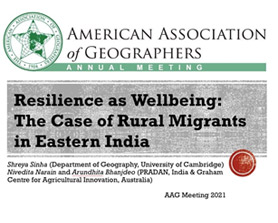 |
|||||||||||||||||||||||||||||
|
Glimpses from Research JUNE 2021 |
|||||||||||||||||||||||||||||
|
Welcome to the seventh edition of Research Newsletter! Read on for
some interesting blogs and articles written by our Research Wing
members, updates from different projects. We also have a section on
blogs and articles from our partners and collaborators. |
|||||||||||||||||||||||||||||
| Articles and Blogs |
|
Towards an effective language of facilitation |
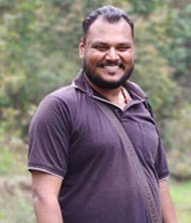 |
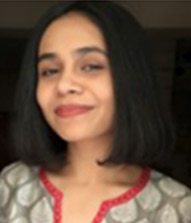 |
The issue is exploitation, not migration |
|
Understanding rural society in pandemic times through virtual field visits |
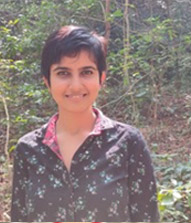 |
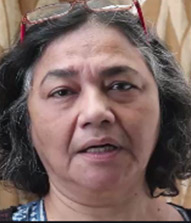 |
Sehjo Singh is an award-winning film-maker who was briefly working as an advisor for participatory Films on project CHIRAG supporting Santal youth and the CHIRAG teams in Chakai (PRADAN) and Koraput (Kalinga Institute of Social Sciences) to discover how to tell the story and who to tell the story to. In this blog, she shares her experiences of working with the two teams and with the Santhal and Kui youth. |
|
||||
| From our collaborators | |
| Here Link to the latest TIGR2ESS Newsletter and GRTA Newsletter | |
| Using an interactive voice response system (IVRS) to share knowledge about dietary diversity Hannah Gray, project officer in the GRTA project at the university of East Anglia writes on one of the key methods of community engagement: IVRS in the two locations: Chakai (PRADAN) and Koraput (Kalinga Institute for Social Sciences). The blog explores in detail what an IVRS is, and how the project is using it to share knowledge about dietary diversity. Please click here to understand more about IVRS and its application, especially in pandemic times |
|
|
Employment diversification among farm labourers: Caste perspective Agriculture is the main source of income worldwide. However, in India there is a declining trend in the proportion of workforce employed in this sector, with many people seeking alternative employment. Dr Pratheepa CM and Dr Rengalakshmi R from MSSRF and TIGR2ESS Flagship Project 1 describe the ability of and difference in two caste groups in rural Tamil Nadu to secure non-farm work. Click here to read their article. |
|
| Understanding the aspirations of farming communities in developing countries: A systematic review of the literature
Aspirations of the rural poor play a significant role in shaping
their activities and investments. Research on the aspirations of
farming communities requires systematic deliberation, because
aspiration studies in developing countries to date have mainly been
confined to education and professional (occupation) studies.
Ravi Nandi and Swamikannu Neduraman from ICRISAT and TIGR2ESS
Flagship Project 1 studied the aspirations of those rural
communities that have chosen to remain in agriculture and published
a systematic review in European Journal of Development Research.
|
|
|
A short film made by the Santal youth volunteers in Chakai, funded by the GRTA-CHIRAG project was selected by the Table-to-Farm video challenge organized by the Youth Alliance for Xero Hunger in line with the UN Food Systems Summit 2021. The youth were asked to choose a national dish and trace back ingredients to the source (e.g. farms, forests or aquatic sources), while highlighting the benefits of the dish and/or challenges of the dish’s ingredients along the food supply chain. The film was submitted by Sushmita Dutta, Executive in Research Wing and based out of chakai. You can watch the film called ‘banwar peetha’ (field rats) by clicking here, and then clicking the play button |
|
|
Convened by Norwich Institute for Sustainable Development (NISD), Rythu Sadhikara Samstha (RySS), Bharat Krishak Samaj (BKS) and TIGR2ESS, we are a part of an Independent Food Systems Summit Dialogue, the title for which is: Women’s Agency and Gender Equity in Food Systems. |
|
| Project Updates | |
| IKEA-PRIDE (Regenerative Agriculture): Three rounds of soil samples were collected from the intervention sites to monitor the Organic carbon, nitrogen, phosphorous, potassium, and pH of the soils in different seasons. Land use-landcover mapping has been used to generate data on the area of land under cultivation. Significant shifts can be observed in the past 10 years in the area under cultivation. Initiatives like the mango plantations and leveling of the land for agriculture are clearly visible through this exercise. Further, geomorphology and drainage mapping has also been carried out for all 12 sites. A farmer practice survey was also carried out to capture the shifts to regenerative agriculture.
GROW: We have reorganized the workplan in the Gender Responsive
Organisations for Women (GROW) project based on COVID-19 situation.
We submitted a case study for the second NRLM Newsletter, the theme
for which was ‘Women Empowerment’. BRP stories were analysed and the
reports are being prepared for each training event and finally data
collection for change stories for clfsC members in place. Sustainability of SHGs (3ie): Presented paper in University of California Berkeley, and aim to submit the paper to a peer-reviewed journal by the end of July.
TIGR2ESS: Data anlaysis is underway and team members are engaged in preparing academic articles and policy briefs. Some of these are: a) Paper on seasonality; b) Looking at migration from a gendered lens; c) Looking at migration from a resilience and well-being lens.
GRTA-CHIRAG: After our first campaign on our IVRS platform,
CHIRAGVaani around sustainable food systems, we started our second
‘summer’ campaign. At the same time, the second wave of COVID stuck
rural areas and we redesigned CHIRAGVaani. GRTA upscaling EMERGE: The manuscript titled “Measuring Women’s Political Empowerment” is under preparation. The manuscript is co-authored by Soledad Prillaman and Natalya Rahman from Stanford University and Nivedita Narain from PRADAN.
DEVELOPMENT-LED INQUIRY: A paper titled “Inquiring Systems and
Development Led Inquiry: Uniting the Efforts of Farmers, Development
Professionals and Researchers” was accepted in a special issue on
Research Methods for the Third Sector in VOLUNTAS journal. We have
recently received reviewer comments and reworking on the paper
before final submission to the journal. This paper describes the
approach that was developed during the ACIAR research projects from
2006-2012; extended to the ACIAR-CSU Pulses project in Pakistan. The
paper is co-authored by Gavin Ramsay from Charles Sturt University,
and Nivedita and Arundhita from PRADAN. |
|
| Welcome and Farewell | |
| We bid farewell to Astha Upadhyay, Research Associate in the TIGR2ESS project and based out of Chakai. We wish her all the best in her future endeavours. |




